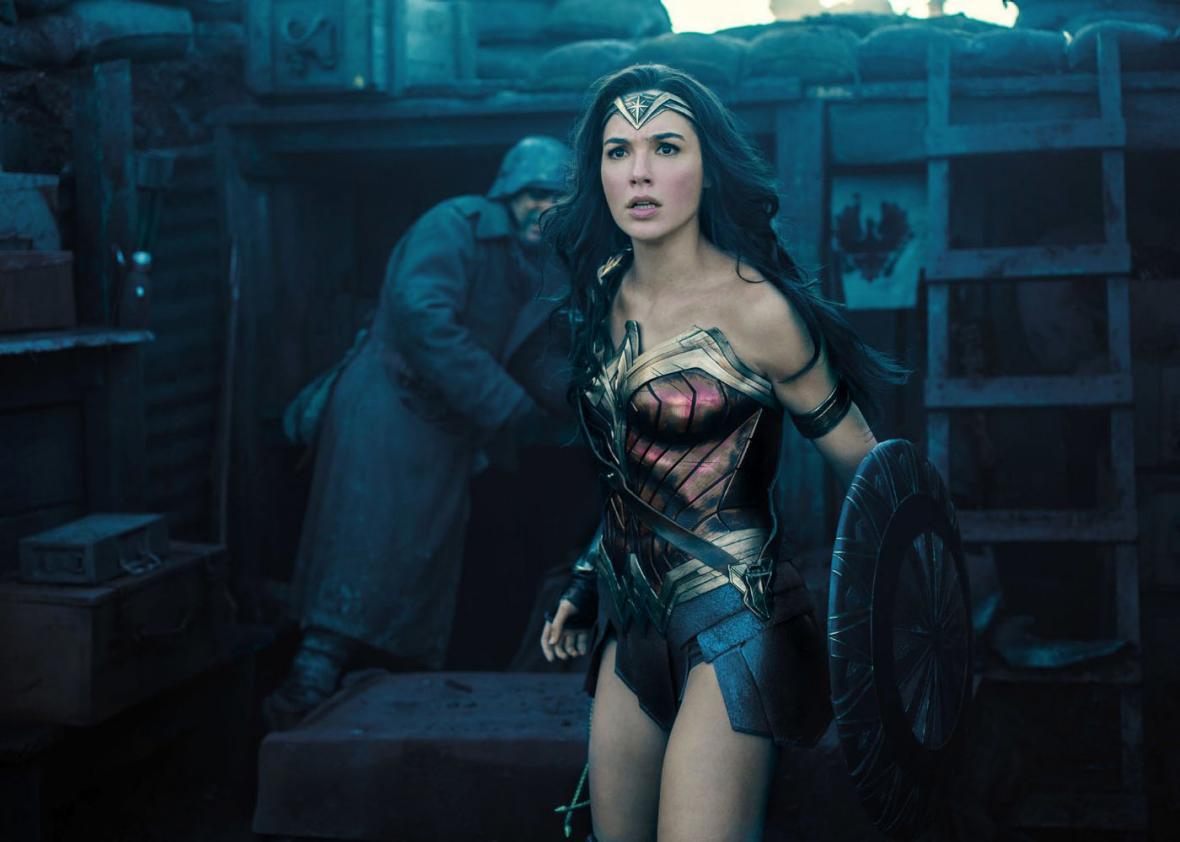Last week, New York magazine’s David Edelstein published a review of Wonder Woman that was written through the fog of his own libido. Blithely unbothered by the irony of objectifying star Gal Gadot in the context of the first (maybe) feminist superhero movie, Edelstein described her as a “superbabe in the woods.” He lamented that the movie did not explore the series’ S&M subtext. He categorized Israeli women as a “breed unto themselves, which I say with both admiration and trepidation.” He used other hepped-up language to communicate that while he was not excited by Wonder Woman, he was really excited by Gal Gadot. Edelstein’s review was widely excoriated for being sexist and misogynist. The review certainly could and should have done its readers the favor of more artfully disguising the status of its writer’s nether regions, but that doesn’t mean boners have no place in criticism. Let’s not throw lust out with the lecherous bath water.
Desire, erotics, aesthetics: These are all an intrinsic part of watching anything. They are also far more elegant terms than the crass boner and the gagtastic lady boner, so I’ll be using them from now on. I don’t need to be coarse. Actors are, among other things, their bodies and faces. Being extremely beautiful is a requirement for famous women and a desirable attribute for famous men. Looks, legs, breasts, pecs are a part of most Hollywood actors’ professional skillsets, and we know this because they do. They work on their bodies like … their bodies are work. The loveliness of watching perfectly formed humans is one of the foundational pleasures of movie-watching and, particularly, middling movie-watching.
It is true, and infuriating, that straight, white, male libidos have been judging cinema and television and the other visual arts for most of history, finding women and reducing them to objects, to just another pretty face (or superbabe in the woods). One of the effects of older white men being the people most comfortable publicly voicing their desire is that desire itself has come to seem boring, predictable, gross, insensitive. Edelstein loved the part of Wonder Woman where she stripped down to her corset? Get outta here! He cared more about that than her status as a maybe–or–maybe not feminist icon? Who could have guessed!
But desire isn’t boring! It’s propulsive. We trust that other physical responses, like tears and nausea, are trying to tell us something about what we just saw. So is lust. Critics, who seek to explain and comprehend their intrinsic responses, don’t often say, by way of convincing readers to watch something, “Timothy Olyphant’s tush!” But I’ve sent that text to a friend, where it was more actionable than the thousands of other words I’ve written in praise of Justified.
Our squeamishness about identifying “eye candy” as a legitimate aspect of entertainment feels especially limiting in the context of the superhero film, which is built on straining biceps and heaving bosoms and other pleasure points in our lizard brains, including ones we feel far more comfortable talking about—like the thrill of violence, the comfort of repetition, the idiotic fascination with things that go boom. Contemporary superhero movies tend to make a big show of being winky and self-aware about their sexiness, but perfect physiques are required. (“How X Movie Star Got Super-Ripped to Play Random Super Guy” is a tabloid staple.) Thor is full of funny examples of shameless beefcakery, and Wonder Woman makes plenty of jokes about how Gal Gadot is hot as a way to inoculate itself against charges of sexism, but she still fights evil in a shimmering metal bra. What these superheroes look like isn’t some tangential aspect of the movies they appear in; it’s the selling point.
And it’s not just the selling point for some faceless, nameless, ignorant heavy breathers out there, though it would be much simpler if this were so. The audience isn’t divided into cavemen who watch movies for the sole purpose of objectifying hot people and the more enlightened among us, who know to privilege other aspects of the cinema. But progressive-minded writers have become so uncomfortable talking about physicality that nearly the only way we discuss it is when it is framed as an injustice, a misogynist boondoggle—the beautiful woman who was forced to get horrendous plastic surgery by the Hollywood machine, the gorgeous woman stuck with the dweeby guy but never the other way around—as opposed to when it’s merely a turn on.
One effect of this body squeamishness is that we’re not writing as much about acting as we used to. Acting is so tied up in physicality, in beauty, a slouch, a smile, a bicep, a gam—and that is a very fraught thing for critics to analyze on the internet in 2017. Directing, writing, ideas: We’re good on that. But when we assess movie performances, we tend to focus euphemistically on the actors’ naturalness or charisma even when the physicality, that smile or that bicep, is what stays with us. It’s not a surprise that the writers who feel most comfortable loudly exclaiming their desire, no matter how squicky, are the same demographic that feels most comfortable doing everything else. Here’s to critics of all genders and orientations letting our own libidos write so freely.
